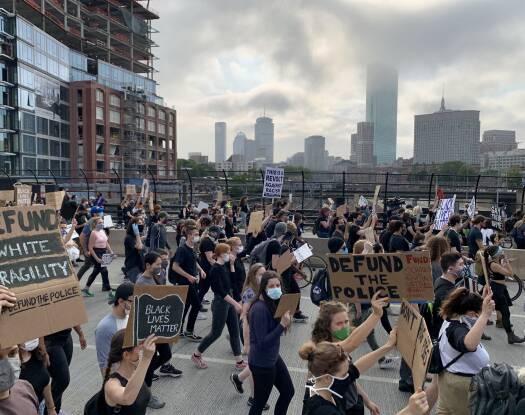Reforming the Boston police has been a hard fought, uphill series of battles over the last 50 years

Activists march at a rally to defund the Boston Police Department, May 31, 2021. (Tori Bedford / GBH News)
It took the police murder of George Floyd in Minneapolis in May 2020 to jump-start Boston’s police reform efforts.
Now, what should be a robust City Hall oversight apparatus — the Office of Police Accountability and Transparency — is in place, and Mayor Michelle Wu is aiming to name a new police commissioner with advice from her hand-picked search committee this spring.
As mayor, Wu has refrained from spelling out specific reforms, but has made clear her intent to hire a reform-minded commissioner. That job will be a monumental challenge given half a century’s record of almost total resistance to change from the police unions that represent the approximately 2,860 current members of the force, the nation’s oldest.
In 2006, Mayor Thomas Menino reached outside the Boston Police Department to appoint Ed Davis, then-superintendent of the Lowell Police, to be commissioner. That decision was met with a concert of gripes.
During a time of high gang activity, Davis reestablished the practice of the commissioner being present at shooting and murder scenes. The message to the community and the police force was clear: “I am watching.”
In his seven-year tenure, Davis was credited with restoring or improving professional standards within the force. He was, however, criticized by officers of color who alleged racial favoritism in promotions. Still, his standing as a nationally recognized police and security expert is likely part of what prompted Wu to name Davis as a member of her search committee.
Boston’s first reformer
In 1972, Mayor Kevin White named the tenacious reformer Robert J. di Grazia, who had been serving as police commissioner of St. Louis County, to be his top cop. Upon arrival, di Grazia met a united wall of resistance. In the process of implementing his reforms, di Grazia seemingly became a union enemy until his departure in 1976.
Toward the end of his tenure, di Grazia’s time was subject to a detailed case study sponsored by the Massachusetts Institute of Technology with funds from the National Science Foundation. It was written by attorney Rory Judd Albert, who declined to be interviewed for this story.
Albert’s report, nevertheless, offers hauntingly relevant insights into the potential challenges the Wu administration and Boston’s next police leader may confront.
Most of di Grazia’s reforms were successful, Albert’s report says, despite the Boston Police Patrolmen’s Association’s obstructive efforts to kill them through the courts and administrative labor actions.
Among those reforms, di Grazia instituted the 911 emergency telephone number, reorganized the department, closed the city jail, discontinued the harbor patrol unit to put more officers and cruisers on streets, and began tamping down overtime abuse. And, significantly, di Grazia created a special investigations unit to detect and prevent corruption within the ranks. While all this was in progress, he led the BPD through Boston’s early and violent years of school desegregation.
Those who remember his tenure said a confluence of several factors contributed to the resistance di Grazia faced: racial and ethnic tension, political pressure and entrenched Boston parochialism.
For one thing, di Grazia was an Italian man leading an historically Irish department.
Former City Councilor Larry Di Cara, now 72, said sometime early on in his tenure, he warned di Grazia of the city’s racism and ethnically based tribalism. Di Cara was relieved when he realized the new “larger than life” commissioner also had a thick skin.
“I said, ‘Y’know, some people aren’t going to like you because of your name, and some people don’t like me because of my name, and you’ve got to deal with it,'” Di Cara recalled telling di Grazia. “That didn’t bother him one bit.”
Former Boston Police Officer Preston Williams, 79, a Black man who served from 1968 to 2003, confirmed that racial and ethnic tension pulsed through the department at the time.
“I could deal with the people in the street, but most of my problems happened within the department,” Williams recalled of the predominately white police force.
“Either they would ignore you, call you names [or] didn’t want to work with you,” Williams said, “There was always some reason they had to keep you alienated. That’s what they did back then.”
The Boston Police Department’s demographics have changed over time. In 1973, just 2 percent of officers were Black, according to data obtained by the Boston Globe. Today, 61.5% of BPD personnel are white, 22.3% are Black, 12.1% are Latino and 2.7% percent are Asian.
